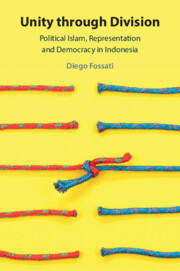Book contents
- Unity through Division
- Unity through Division
- Copyright page
- Dedication
- Contents
- Figures
- Tables
- Acknowledgments
- 1 Introduction
- 2 Explaining Democratic Survival in Indonesia
- 3 The Ideological Roots of Electoral Politics
- 4 Political Elites and Ideological Competition
- 5 Public Opinion on Political Islam
- 6 Ideological Representation
- 7 Meaning and Evaluation of Democracy
- 8 Conclusions
- References
- Index
3 - The Ideological Roots of Electoral Politics
Published online by Cambridge University Press: 15 September 2022
- Unity through Division
- Unity through Division
- Copyright page
- Dedication
- Contents
- Figures
- Tables
- Acknowledgments
- 1 Introduction
- 2 Explaining Democratic Survival in Indonesia
- 3 The Ideological Roots of Electoral Politics
- 4 Political Elites and Ideological Competition
- 5 Public Opinion on Political Islam
- 6 Ideological Representation
- 7 Meaning and Evaluation of Democracy
- 8 Conclusions
- References
- Index
Summary
This chapter examines aggregate electoral returns to measure the influence of the political Islam cleavage on voting behavior in contemporary Indonesia. Existing research suggests that electoral behavior is driven primarily by patronage, candidate traits and evaluations of government performance rather than ideological and partisan considerations. Yet existing studies do not analyze the full spectrum of available electoral returns (both over time and across district) to reach such conclusions. As a result, our understanding of how deep-seated partisan affiliations rooted in political Islam have shaped voting behavior since democratization is incomplete. A quantitative analysis of district-level electoral returns from five legislative elections indicates that electoral geography today presents important continuities with the first democratic election of 1955, when politics was highly ideological and polarized. Furthermore, a longitudinal analysis indicates that the importance of historical partisan affiliations as a driver of voting behavior, after plummeting in the 2009 elections, has increased significantly in recent years.
- Type
- Chapter
- Information
- Unity through DivisionPolitical Islam, Representation and Democracy in Indonesia, pp. 43 - 72Publisher: Cambridge University PressPrint publication year: 2022

